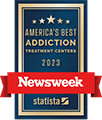Within Wilmington and its surrounding communities, there has been a recent surge in the distribution of a substance that is being marketed as “non-lethal” heroin. Due to the fact that this substance has earned the reputation of being “non-lethal,” many individuals are under the misguided perception that it is safe to use. This, however, could not be further from the truth.
This particular strain of heroin allows individuals to achieve a stronger high by ingesting a smaller amount of the substance itself. In other words, it gives users “more bang for their buck.” Due to the fact that these people are consuming a smaller amount of heroin, their risk for overdosing decreases.
While it is obvious that having less people overdosing is immensely encouraging, a problem arises in the fact that this makes individuals assume that it is safe to be using this drug. Individuals are beginning to feel less of a need to seek help for a heroin abuse problem because they no longer feel that they are in danger of overdosing. Yet, simply because a person does not overdose the first few times that he or she uses heroin does not mean that the risk of future overdose is eliminated. Furthermore, even if a person does not overdose on heroin, the detriments that he or she is inflicting on his or her body are innumerable.
Additionally, the sale of heroin laced with other chemicals has become increasingly popular, adding to the ever-present dangers associated with the use of this drug. Most disturbingly, heroin is being laced with fentanyl, an extremely powerful synthetic opioid that has been linked to an epidemic of overdoses. When heroin is laced with other chemicals, it becomes especially dangerous, and potentially lethal. Furthermore, because individuals can never be certain what chemicals are actually being laced into the heroin they are consuming, they have no way of knowing how their bodies will react.
In order to understand the dangers behind prolonged heroin use, it is important to understand how the body responds to the substance. Even if an individual is initially consuming a lower dose of heroin, his or her body will eventually become tolerant to the presence of the substance, meaning that he or she will be forced to consume greater quantities in order to achieve the high that he or she desires. As the quantity that is ingested increases, the person is then at risk for overdosing.
Furthermore, the use of heroin produces significant damage to one’s physical and mental health, as well as to his or her ability to function appropriately on a daily basis. For example, abusing heroin can result in clogged blood vessels, irreversible cognitive impairment, and damage to vital organs. For those individuals who ingest heroin intravenously, they also become vulnerable to contracting viruses like hepatitis and HIV/AIDS. Disturbances in reproductive functioning, heart attacks, strokes, and seizures have also been known to plague individuals who abuse heroin.
For these reasons and more, it is imperative that individuals do not succumb to believing the falsity that there truly exists a non-lethal form of heroin. Whether it be due to an overdose or to a medical condition that is the direct result of heroin use, death is an ever-looming risk that those who abuse this substance face. Anyone who is struggling with the compulsion to abuse heroin should promptly seek and receive treatment so as to prevent such devastation.
If you or a loved one is trapped in the vicious cycle of heroin abuse, or if you have any questions regarding this new strain of heroin, please do not hesitate to contact the staff at Wilmington Treatment Center today.













